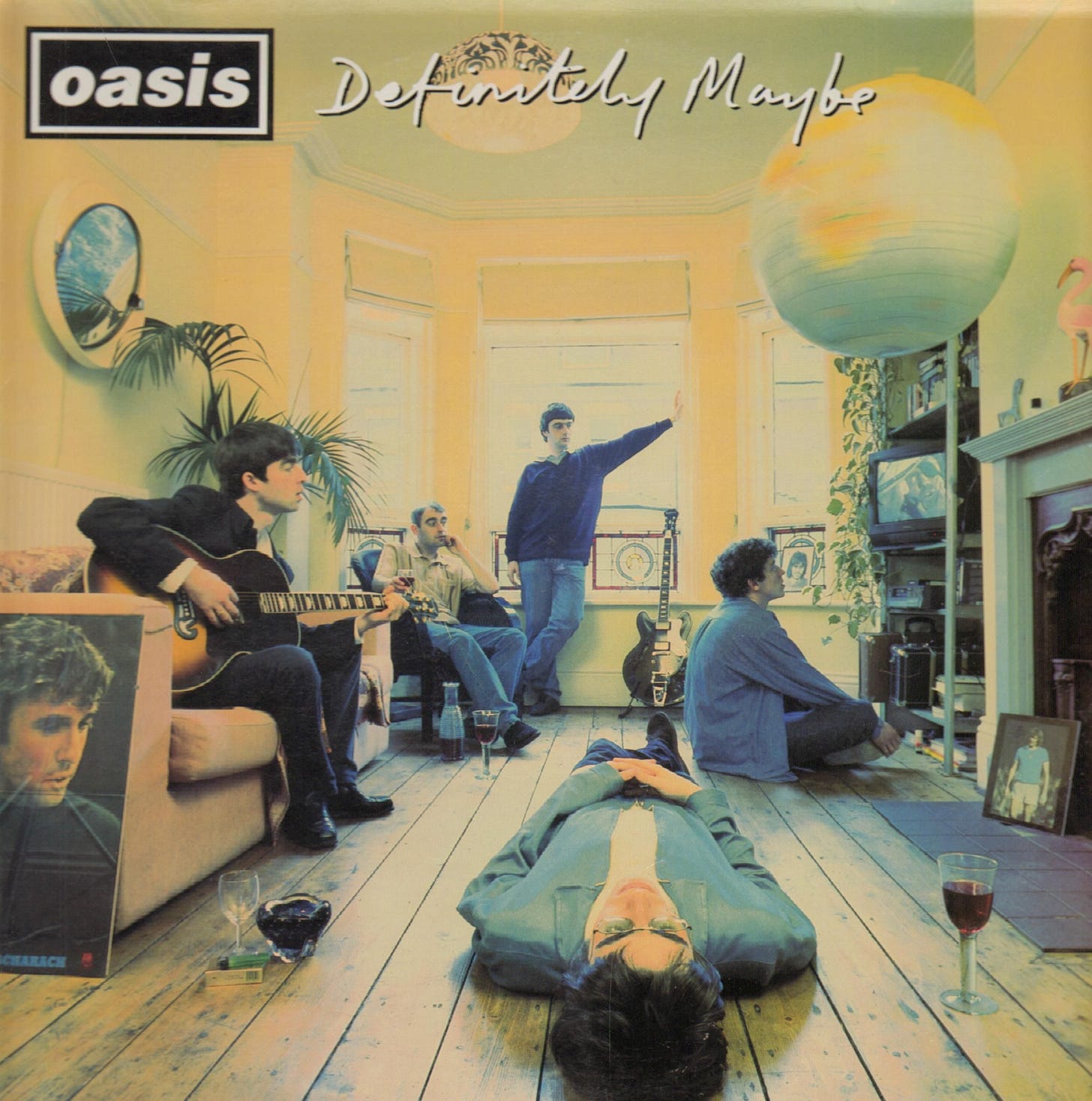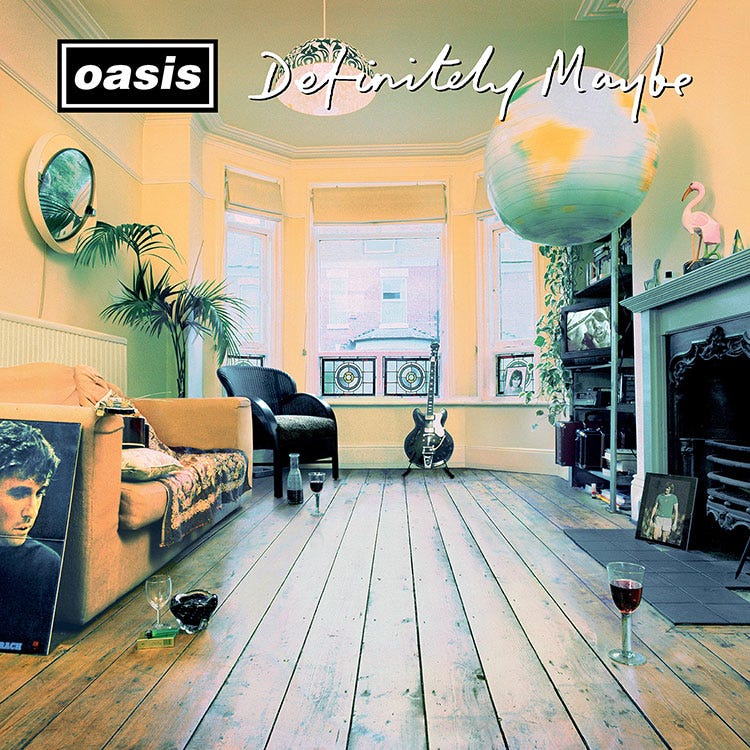Oasis Reunites
Noel and Liam Gallagher reconcile just in time for the 30th Anniversary of Definitely Maybe.
Almost 15 years to the day after Noel Gallagher pulled the plug on Oasis in 2009, issuing a statement declaring "I simply could not go on working with Liam a day longer," the brothers Gallagher announced that a new day is dawning: Oasis plans to reunite in 2025 for a tour that would coincide with the thirtieth anniversary of their blockbuster (What's the Story) Morning Glory.
Conspicuously absent in the announcement is any mention of who else is playing in Oasis come 2025. Logic dictates that it'll likely be Noel Gallagher's High Flying Birds fronted by Liam Gallagher—HFB features guitarist Gem Archer and drummer Chris Sharrock, who both played in Oasis as well as Liam's post-Oasis outfit Beady Eye; Paul "Bonehead" Arthurs hasn't played with the band since 1999 and underwent a cancer scare in 2022—but the fact that the lineup is entirely incidental in the coverage speaks volumes to how the Gallaghers and Oasis are often seen as synonymous.
A new expanded 30th Anniversary reissue of Definitely Maybe, the band's 1994 debut, offers a reminder that Oasis always has been dependent on music chemistry that extends beyond the Gallaghers. This edition features a pair of early drafts of Definitely Maybe, both thought lost to time: a dry run at Monnow Valley with Dave Batchelor, an associate of Inspiral Carpets—Noel served as a roadie for the baggy band during their prime—then rough mixes of sessions at Sawmills where the group captured much of what wound up on the proper record. The difference between the two batches of outtakes and the finished mix by Owen Morris is startling, particularly in regards to the Monnow Valley recordings. Batchelor ran Oasis through conventional studio procedures, isolating each musician and giving the mix a tremendous amount of air, a technique that oddly makes the band sound small and brittle. These tapes feel like a product of their time, an indie band with aspirations outside of their reach. If these recordings wound up on Definitely Maybe, there's a chance that Oasis would be a forgotten figure in the great '90s British pop explosion, a footnote on the level of Kingmaker.
Everybody in the Oasis camp recognized that the Monnow Valley sessions missed the mark. The group rushed into Sawmills, pushed the faders into the red, creating the raw elements of Definitely Maybe, a record defined by its onslaught of guitars: not so aggressive as pummeling, demanding acquiescence of the listener. The sheer volume distinguished Definitely Maybe from the other Britpop bands that arose in the wake of Suede, the band that changed the meaning of commercial success for British indie when their debut went to number one in the spring of 1993. Eighteen months later, Suede were forever consigned to the fringe—a place where they would flourish—and Oasis steamrollered over all competitors as Definitely Maybe shot to number one.
Definitely Maybe turned out to be the first act for Oasis, establishing the band's sounds and themes under cover of youthful exuberance. The band hit their stride at the end of 1994 as "Whatever" came close to achieving the coveted Christmas number one slot, ratcheting up their commercial success while expanding the parameters of what was becoming to be known as Britpop: it's light and sweet, aided by a swirling string section out of "All You Need Is Love."
For my money, "Whatever" is the closest Oasis ever sounded like the Beatles, a comparison the Gallaghers incessantly touted but never made much sonic sense. Oasis closed their concerts by stripping "I Am the Walrus" of its mystery, a choice that telegraphed how the band dealt in primary colors: nuance was a nuance, especially with melodies that could hold their own with Lennon, McCartney and Weller. Those melodies, seemingly excavated not written, were the primary reason why Noel Gallagher was credited as the band's solitary creative force during the 1990s. This is especially true during the band's glory years of the mid-1990s, when Noel sang the bittersweet tunes on the B-sides and album tracks—not to mention "Don't Look Back in Anger," which pointedly was the group's second number one in the UK, besting their standard "Wonderwall"—leaving Liam the rockers and anthems, songs that suited his nasal whine.
Liam eventually started writing songs—by 2003, his "Songbird" wound up as a Top Ten British hit in 2003, a highlight from Heathen Times, an album that found Noel receding from the spotlight—but at Oasis's peak, he was seen as little more than a vessel for Noel's tunes, a construction that inevitably favors the composer. Time has suggested that Liam's gift may be rarer than Noel's. The latter has produced a handsome body of work with his High Flying Birds but their records tend to be stuffy, prizing classicism over the electric snap of pop. Liam, who rarely talked about music in interviews if it wasn't the Beatles, possesses a sharper ear for contemporary mores, working with TV On The Radio's Dave Sitek on the final Beady Eye album, then collaborating with Greg Kurstin, Andrew Wyatt, Ezra Koenig and Dave Grohl on his solo records.
There's also the fact that Liam Gallagher is the rare rock singer whose power derives from the grain on his voice, not his enthusiasm or range. At the height of Oasis's reign, he never exerted himself, singing with his hands pinned behind his back or banging on a tambourine. His choices may not have been lively but they were charismatic: his lack of movement provided a center of gravity for Oasis to orbit along with their audience. His stillness and controlled range also suggests this modern revival of Oasis may have musical merit. Recent years have suggested that Liam no longer indulges in the excesses that forced him to be a spectator during Oasis's MTV Unplugged set: he's sharp, controlled and self-effacing, nimble enough to seem lithe but never bothering with fads.
Oasis may be forever identified with youth, a connection hammered home by this 30th Anniversary edition of Definitely Maybe, an album where the group seems intent to outrun their hometown. Definitely Maybe is littered with images of escape and freedom, a reflection of Noel Gallagher's decision to scuttle his vulnerable moments to the B-sides. These songs are absent on the new reissue—there are no previously released non-LP tracks, presumably because they all appeared on previous commemorative editions—but "D'Yer Wanna Be A Spaceman?," "Take Me Away" and "Fade Away" are littered with tarnished dreams and faded aspirations, emotions that certainly were familiar to a Noel Gallagher facing his thirtieth birthday but gain more resonance now that he and Liam are on the other side of fifty. Those songs aren't likely to be featured on the setlist for Oasis '25 but they're the ones that suggest to me that this reunion is something more than a cash grab: underneath their roar and swagger, Oasis always pulsated to the unpredictable rhythms of a human heart.





